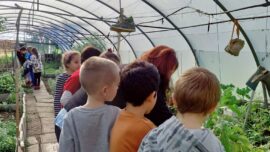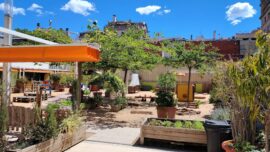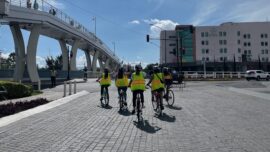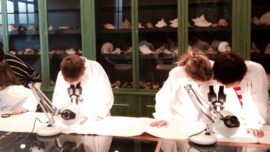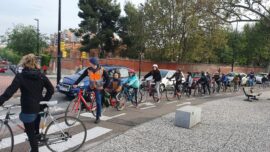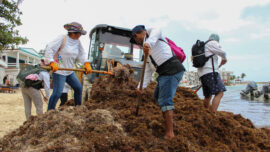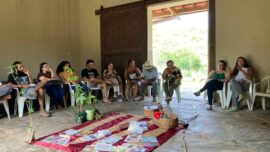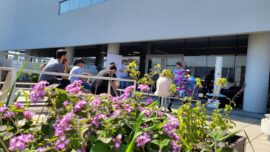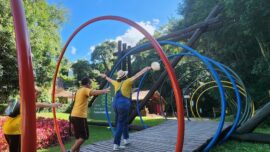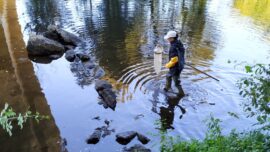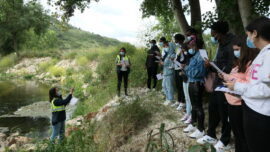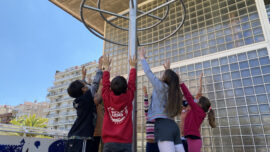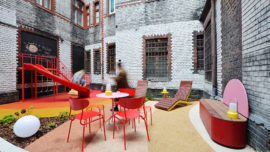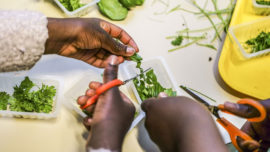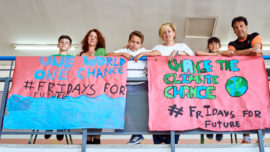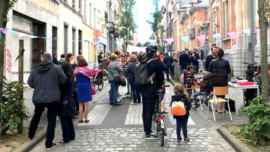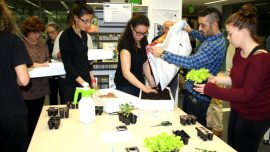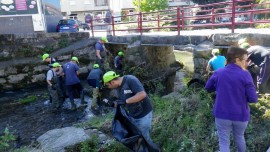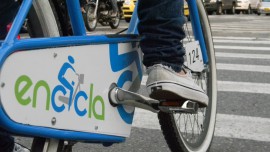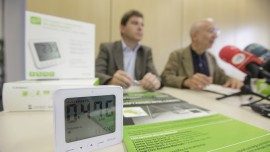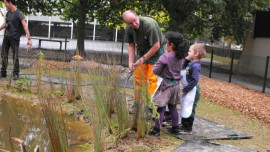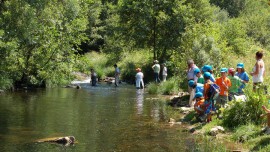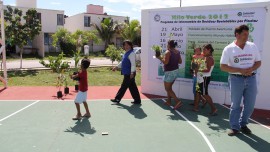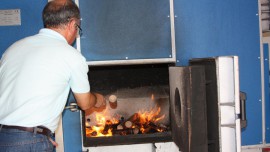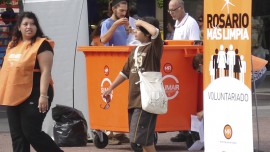Environment
In this framework, Educating Cities made a commitment to progressing towards a more sustainable urban development, not only in environmental terms, but also in social, cultural and economic terms, as part of the12th International Congress of Educating Cities, as can be seen in the Declaration of Changwon. This is an option that involves citizen education in order to achieve a change in values, principles and behaviour.
Principles of the Charter: 8 and 11
Links
Experiences - News
Urban vegetable garden for schoolchildren
The Urban vegetable garden for schoolchildren project promotes integration and ecological education through urban gardens, involving immigrants and schoolchildren in intercultural and sustainable workshops. [...]
Nurseries for the climate
Barcelona declared a climate emergency in 2020 and launched “Nurseries for the climate” to transform more than 100 nursery schools in six key areas, with the support of the educational community. [...]
Cycling School with a Gender Perspective
The project was created with the aim of providing girls and women of all ages in León with tools that foster their autonomy and allow them to take ownership of public spaces. It also aims to promote the use of the bicycle as a clean, efficient and healthy means of transport. [...]
Biodiversity and Bioindication Research Group (BiBio)
BiBio is a research group, based at the Museum of Natural Sciences of Granollers (MCNG), that specialises in monitoring fauna and providing knowledge about the biodiversity. For this purpose, the group has developed a volunteer network with more than 1,000 people. [...]
STARS Project: sustainable, active and independent mobility
STARS is a sustainable, active and independent mobility project in Europe intended for primary and secondary school students, which involves the entire educational community and focuses on the use of bicycles as a regular means of transport. [...]
Sargassum: a city’s resilience
A series of maintenance, preservation and conservation programmes for cleaning the beaches that promote social and workplace inclusion, environmental education and culture in order to favour the social and economic development.
[...]
Farming clubs
The initiative aims to empower rural population, by providing tools and knowledge to improve farming practices, promoting innovation and boosting resilience in a constantly evolving agricultural climate. [...]
Sustainable Ministry Programme
The programme aims to promote a new environmentally responsible culture among the personnel of the Ministry of Education of the Autonomous City of Buenos Aires, incorporating sustainability criteria in its management practices and processes, in line with the work carried out in schools. [...]
Water, Camera and Action – socio-environmental educommunication
The project aims to generate conditions for young people between 15 and 29 years old to experience socio-environmental learning about water problems in the city, according to their perceptions while at the same time valuing the specificities of each territory. [...]
Municipal School of Sustainability
An innovative space that promotes environmental education in the city of Curitiba, located in a recovered natural landscape that implements diverse and intersectoral training actions, intended for different audiences, from children and teenagers to adults and the elderly. [...]
Creating More Natural, People-Friendly Outdoor Spaces at Schools
The City Hall of Cascais understands the need to adapt the municipal primary school playgrounds and transform them into more natural, people-friendly spaces in order to make the most of their potential as an educational space. [...]
Green Currency: Exchanging organic waste for money
The project begins with the separation of organic household waste by citizens, which is then taken to collection points, where people receive 1 unit of Green Currency for every 5 kilos of organic waste. This waste is later treated and converted into fertiliser. [...]
The Ave for Everyone in Guimarães
The project was born with the objective of promoting citizen participation in the conservation and improvement of the Ave River, and proposes a multidisciplinary and dynamic approach to empower the citizens of the municipality in the management of their own water resources. [...]
Generation S: Food Sustainability Programme
The project, implemented in all schools of Esposende, is based on a food sustainability plan that seeks to promote a change in attitudes and behaviors among the new generations in the face of global environmental problems. [...]
EMEA Park School: Good educational practices for full and sustainable citizenship
The Parque Tangará Municipal School of Environmental Education (EMEA), in Santo André (Brazil), offers activities for citizens to learn ways of living in the city in a sustainable way and integrated with the environment. [...]
Rivers With Life
Under the tagline 'giving rivers back to the people', the project makes the connection between the past and the future of water, showing people the region's natural wealth and the regeneration work being carried out in rivers with a view to fostering active citizenship to protect them. [...]
Climate Shelters at Schools
"Let's adapt schools to climate change through green, grey and blue" aims to transform schools into salubrious spaces by incorporating vegetation, shade and water sources. [...]
Pimp my yard
Pimp my Yard is a project that seeks to educate and raise social awareness among citizens. The project is based on social participation, community initiatives and responsible design. [...]
Sustainable Food Plan
A municipal system of agro-ecological, fair and local collective catering. [...]
50/50 Energy Saving Project
Engagement of entire educational community in saving energy and water through raising awareness and changing habits. [...]
School Street
It consists of temporarily closing the street (or part of it) that leads to a school while the pupils are arriving or heading home (approximately thirty minutes), in order to improve road safety and air quality. [...]
Green Library at the municipal libraries of A Coruña
An initiative begun in 2013 that fosters awareness of citizenship through sustainable practices and respect for nature, by engaging the municipal libraries in environmental commitment. [...]
The Rivers Project
The Rivers Project encourages citizen participation in the conservation and improvement of our rivers through citizen awareness of the problems of our fluvial eco-systems and the need to protect them. [...]
The EnCicla public bicycle system
A sustainable mobility proposal for the city of Medellin and the Metropolitan Area of Aburrá, an alternative system integrated into, and complementary to the city’s mass public transit system. [...]
Energy training using smart meters in homes
In the framework of this domestic training programme about energy saving, 100 volunteer families were given a smart electricity meter for six months as a tool for controlling and becoming aware of home electricity consumption. [...]
Shared Gardens
Citizens who live in apartment blocks, which do not have private green areas, transform the public space at the street level of their buildings into a community garden, which would in turn foster more direct contact amongst neighbours and socialization. [...]
Vila Real Biodiversity Conservation Program
The aim of the Program is to ensure the preservation of the city’s rich biological heritage through local development and connecting people to the environment that surrounds them. [...]
Green Kilo
In order to promote recycling, once a moth this program is carried out and consists in an exchange of kilos of recyclable waste for plants that are native to the Quintana Roo region. For every kilo brought in the person receives a plant. [...]
Creation of a briquette manufacturing
Paredes is a city that has 1,260 furniture factories. Aware as it is of this fact, the City Council looked for a solution in order to recycle the wood left over of the factories, transforming it into briquettes, which are used as fuel in schools and other public establishments. [...]
A Cleaner Rosario
The City Council of Rosario set up this program in 2009 with the goal of dealing with the waste management from a cross-disciplinary, participatory perspective, opting for a cultural change. [...]

